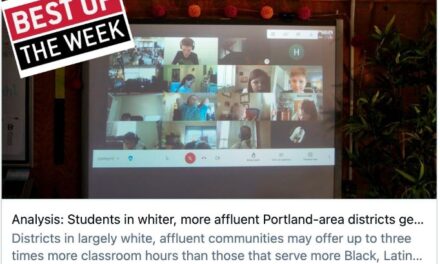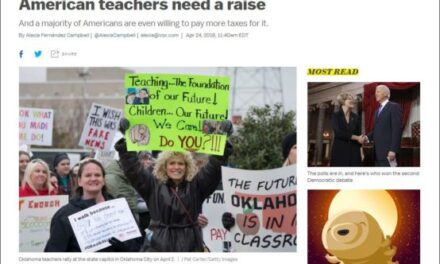A daily update featuring coverage, resources, and ideas to help journalists cover the massive impact of the coronavirus crisis on schools.
THE TOP FIVE
Here are five (or so) great education stories about how schools are responding to the COVID-19 crisis:
🏫 Teachers’ Herculean Task: Moving 1.1 Million Children to Online School – The New York Times
🏫 Tenderness, tenacity and tech support: How one Houston-area school is moving classes online – Houston Chronicle
🏫 Florida schools are responding differently to the pandemic than other states – Tampa Bay Times
🏫 Montgomery County schools launch remote learning: ‘It will be chaotic’ – The Washington Post
🏫 A ‘Great Big Digital Divide’ Is Hampering LA Schools Efforts To Teach Remotely – LAist/KPCC Public Radio
🏫 With schools closed from coronavirus, these teachers air TV lessons. – USA Today
A BIRD’S-EYE VIEW
Over the weekend, the New York Times editorial page provided the mainstream overview of school districts’ remote learning response that we were all waiting for, describing “considerable confusion” among districts and the relative scarcity of device distribution and Internet access initiatives.
The picture the Times editorial painted wasn’t a pretty one, but it’s critically important. A couple of other editorial pages including the Washington Post, and NY Post have conveyed a strong sense of urgency about the need for districts to ramp up high-quality remote learning programs.
It would be good to have more reporters giving readers a systematic look at the unevenness of remote-learning efforts and quality across regions and the nation.
TOUGH QUESTIONS
Journalists shouldn’t stop asking questions about how public officials responded to the crisis, says the Columbia Journalism Review’’s Jon Allsop — though officials are asking them to. “Assessing the mistakes that got us here isn’t an indulgent distraction,” notes Allsop, “and asking officials about them isn’t gotcha journalism.”
One strong example is WBUR’s close look at the chaotic period during which Mass. school leaders decided to shut down on their own.
Speaking of tough questions, what impact has the confused response from the USDE regarding services to SPED students had on districts’ decisions to begin providing remote services to kids? The confusion has been alluded to in several stories like this Friday piece from NPR, but the story seems to have fallen off the face of the earth in the hullabaloo of rushed school closure decisions and half-baked remote learning programs.
UNACCOUNTED-FOR STUDENTS
“Two weeks after many school building closures began, tens of thousands of students may be unaccounted for by their schools and districts,” writes 50CAN head Marc Porter Magee in issue #3 of the New Reality Roundup, a helpful new newsletter.
In it, Magee also points out that most state leadership to date has been “focused on setting limits for instruction and learning” rather than, say, setting minimum requirements.
Any other great new COVID-19 resources out there, from media outlets or otherwise? We’d love to know about and share them.
TIDBITS
The PBS NewsHour is working on a new broadcast segment focused on education in the coronavirus era. Meantime, check out this educator-written extra.
😷 The New York Times featured Chalkbeat’s Elizabeth Green in a media piece about the need to reinvent journalism.
😷 “The NYC Department of Education delivered an iPad loaded with internet to Allia, the 10-year-old girl featured in our story about the digital divide in the city,” updated the NYT’s Kita Stewart in a recent tweet.
That’s it! You’re all done! Starting tomorrow, The Grade will begin to publish a series of reported pieces about covering the COVID-19 crisis. First among them will be the story behind the EdWeek school closure map, models for including immigrant and ELL students in your COVID-19 stories, and a first look at the rise and fall of mainstream coverage of COVID-19 on schools — and its steep decline in the past week.
ABOUT THE AUTHOR

Alexander Russo
Alexander Russo is founder and editor of The Grade, an award-winning effort to help improve media coverage of education issues. He’s also a Spencer Education Journalism Fellowship winner and a book author. You can reach him at @alexanderrusso.
Visit their website at: https://the-grade.org/

















